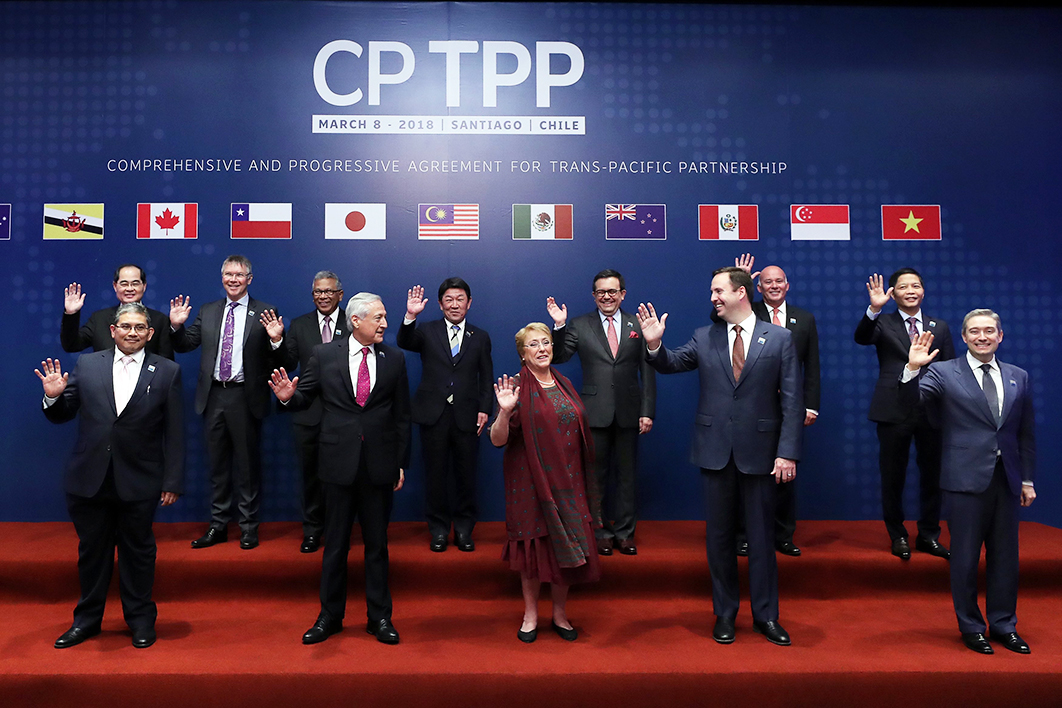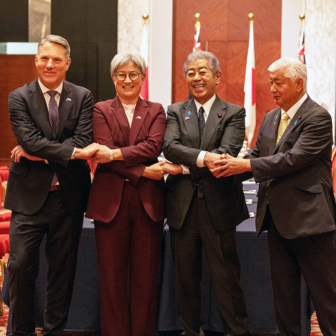Can trade agreements protect labour standards? For their proponents, the answer is an unequivocal yes. Take the relevant chapter in the Comprehensive and Progressive Trans-Pacific Partnership agreement, commonly referred to as the TPP, which the Australian government sees as the gold standard in the field. The agreement’s preamble promises to “protect and enforce labour rights, improve working conditions and living standards, and strengthen cooperation and the parties’ capacity on labour issues.” No ifs or buts there.
For the Canadian government, the TPP’s chapter on labour “seeks to ensure that economic development is not achieved at the expense of workers’ rights.” For the US government — at least before it withdrew from the agreement — the chapter provides “the strongest protections for workers of any trade agreement in history,” setting a “high-water mark for labour protections in a trade agreement.”
We disagree. We believe that the TPP’s labour provisions are destined to be ineffectual because they include both flexible standards and what might be called standards for flexibility, as well as allowing mutually assured non-compliance. These flaws highlight the need to radically reconsider labour provisions in trade agreements so that they fulfil their promise of protecting employees.
By “flexible standards,” we aren’t simply referring to the flexible application of labour regulations. We are referring to situations where the flexibility is so significant as to seriously call into question whether a standard is being laid down at all — where the flexibility is so considerable that we are inclined to say that there is no legal norm.
It is this kind of flexibility that we find with the centrepiece of the TPP’s labour chapter, Article 19.3:

Both of these sub-clauses provide for flexible standards, as we’ve described. In sub-clause (1), the flexibility stems from a reliance on “the rights as stated in the ILO Declaration.” Given that there are no rights stated in the ILO Declaration — only principles informed by the rights in the ILO conventions that the TPP expressly excludes from the agreement in footnote 3 — this is a poor piece of drafting, at best.
What this means for the scope and content of labour rights will become clear only when arbitral decisions begin to be made under chapter 28 of the agreement. The grindingly slow processes under labour provisions of US trade agreements strongly suggest that this could take quite some time: the first and only such decision was handed down more than nine years after the complaint was lodged.
It is also unclear whether the Article 19.3 principles will be interpreted in the light of ILO supervisory bodies have interpreted the rights from which they are drawn. Crucially, does the “freedom of association and the effective recognition of the right to collective bargaining” include the right to strike? This right isn’t explicitly mentioned in the ILO Conventions 87 and 98, but it has been held by the ILO supervisory bodies to be implied by Articles 3 and 10 of the Convention Concerning Freedom of Association and Protection of the Right to Organise.
The flexibility of sub-clause 2 of Article 19.3 is obvious, and not only because footnote 5 leaves the determination of what are “acceptable conditions of work” to the discretion of individual governments. The sub-clause also fails to refer to the many ILO conventions and recommendations. (Eighteen conventions and twenty-three recommendations relate to occupational safety and health alone; no fewer than thirty-four conventions deal with hours of work, holidays and night work.)
As well as these flexible standards — ostensibly hard legal provisions that turn out to have rubbery insides — the TPP’s labour chapter allows legalised minimalism through standards for flexibility: non-existent standards, liquid-soft obligations, and heavily qualified obligations.
The preamble to the 1998 ILO Declaration on Fundamental Principles and Rights at Work suggests the areas where the labour chapter ought to have laid down standards but failed to do so. “The ILO should give special attention to the problems of persons with special social needs,” it says, “particularly the unemployed and migrant workers.” Rather than “special attention,” the labour chapter pushes these groups to the margins, burying issues that specifically concern them within the numerous topics that can be subject to cooperative activities between the parties.
Accompanying the absence of standards in relation to the unemployed and migrant workers are liquid-soft obligations. We find examples in Articles 19.6 and 19.7, which speak for themselves (emphasis added):
Article 19.6: Forced or Compulsory Labour
Each Party shall also discourage, through initiatives it considers appropriate, the importation of goods from other sources produced in whole or in part by forced or compulsory labour, including forced or compulsory child labour.Article 19.7: Corporate Social Responsibility
Each Party shall endeavour to encourage enterprises to voluntarily adopt corporate social responsibility initiatives on labour issues that have been endorsed or are supported by that Party.
Finally, the labour chapter’s heavily qualified obligations provide too much flexibility. In most — if not all — cases, a breach of the obligations in this chapter only happens when it can be shown to occur “in a manner affecting trade or investment.” This is explicit with the three most significant provisions (Article 19.3, Labour Rights; Article 19.4, Non Derogation; Article 19.5, Enforcement of Labour Laws). But even where other provisions impose substantive obligations, some of the processes under the chapter strongly suggest that allegations of their breaches need to establish how they occur “in a manner affecting trade or investment” (for example, Article 19.2(c): Public Submissions; and Article 19.11(2): Cooperative Labour Dialogue).
In practice, interpreting “in a manner affecting trade” is likely to present formidable, perhaps insurmountable, challenges, in terms of both the financial evidence and the degree of specificity it requires. These demands could easily asphyxiate the TPP’s labour standards.
And mutually assured non-compliance? Article 19.3(1) of the TPP commits the parties to adhering to the ILO Declaration on the Fundamental Principles and Rights at Work of 1998. Given its flexibility, there is a clear danger of a “minimalist” approach to this commitment.
What would a more robust approach look like? It would recognise that the four labour principles in Article 19.2(1) are based on the eight fundamental conventions of the ILO:
Convention 29 (Forced Labour Convention, 1930)
Convention 87 (Freedom of Association and Protection of the Right to Organise Convention, 1948)
Convention 98 (Right to Organise and Collective Bargaining Convention, 1949)
Convention 100 (Equal Remuneration Convention, 1951)
Convention 105 (Abolition of Forced Labour Convention, 1957)
Convention 111 (Discrimination (Employment and Occupation) Convention, 1958)
Convention 138 (Minimum Age Convention, 1938)
Convention 182 (Worst Forms of Child Labour Convention, 1999)
Only three of the eleven signatories have ratified all eight fundamental conventions. The remaining eight signatories have ratified only a selection:
Australia: 7 (not Convention 138)
Brunei: 2 (not 29, 87, 98, 100, 105 or 111)
Japan: 6 (not 105 or 111)
Malaysia: 6 (not 87 or 111)
Mexico: 7 (not 98)
New Zealand: 6 (not 87 or 138)
Singapore: 6 (not 87 or 111)
Vietnam: 5 (not 87, 98 or 105)
Judged against these conventions, all signatories to the TPP are in breach of Article 19.3(1). Another area of non-compliance derives from long-running deficiencies in implementing existing conventions. Australia is no stranger to breaches of the freedom of association conventions, for instance, and not in any trivial sense. Since 2010, it has been clear that foundational aspects of the federal Fair Work Act — restrictions of the subject matter of bargaining and the right to strike — are in breach of these conventions.
Finally, there is the fact that the obligations under the labour chapter, however attenuated, are unlikely be enforced by the signatories. Except for Canada, none of the TPP signatories strongly supports the labour provisions; for them, the TPP is principally directed at market access. “Developed” countries like Australia, Canada and New Zealand seem to believe that they are already in compliance with such provisions, despite compelling evidence to the contrary. This belief carries with it the assumption that the agreement’s labour chapter won’t require any significant regulatory changes, an assumption that “developing” countries are unlikely to disturb given their own lack of compliance. All this will be reinforced by the flexibility of the chapter. Even without the United States, there will likely be mutually assured non-compliance.
How could the labour provisions in trade agreements be made more effective? First, all signatories should be required to ratify and implement the eight ILO fundamental conventions, the ILO conventions on labour migration, and the ILO conventions on social security. This obligation should expressly incorporate ILO jurisprudence. And breaches of this obligation should not be limited to those that occur “in a manner affecting trade or investment.”
Signatories must understand that they will need to make significant changes to law and policy to comply with this obligation. All signatories should develop Labour Consistency Plans, and these should be vetted by the ILO. The labour provisions should also provide that a failure to implement provisions of these Plans would be presumptively considered a breach.
Finally, an effective remedy must be in place for cases of non-compliance, consistent with basic rule-of-law requirements. That means access to an independent body to resolve the dispute, with workers’ organisations having the right to make a complaint in any case where they have an interest. In the event of a breach of labour standards, the same remedies should apply as in the case of violations of the rights of investors under the other provisions of the trade agreement. In other words, there should be no discrimination between labour and capital on the enforcement of rights. •
This article draws on the authors’ submission to the inquiry of the Senate Foreign Affairs, Defence and Trade References Committee into the Proposed Comprehensive and Progressive Trans-Pacific Partnership Agreement.




